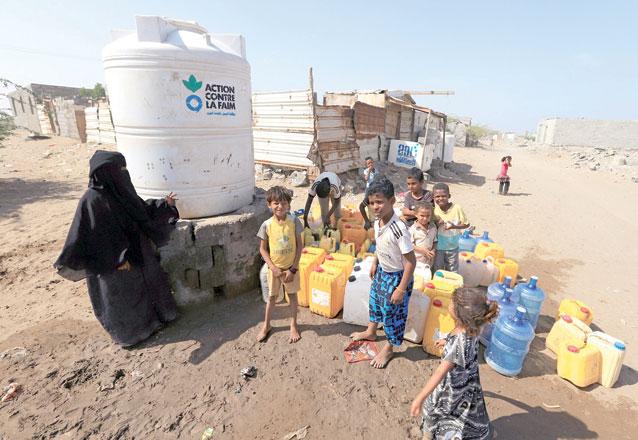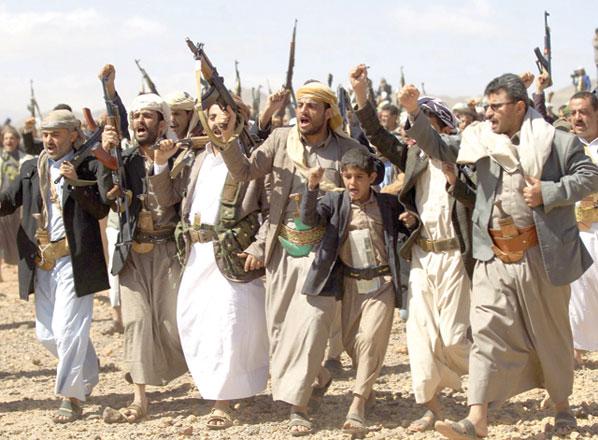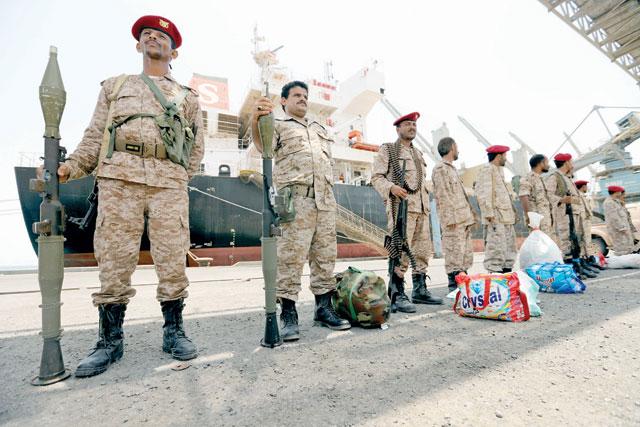You are here
Heavy fire rocks Yemen's Hodeida as UN pushes to clinch troop pullout
By Reuters - Mar 25,2019 - Last updated at Mar 25,2019

Children wait to fill jerry cans with drinking water on Salam Street in north Hodeida, Yemen, on Monday (Reuters photo)
ADEN — Yemen's warring parties exchanged heavy weapons fire overnight in Hodeida, residents and military sources said, as the United Nations scrambled to salvage a ceasefire deal in the Yemeni port city that is a lifeline for millions at risk of starvation.
The clashes were the heaviest since the ceasefire went into effect on December 18, residents said, and came as the United Nations announced a deal setting out details of a mutual military withdrawal envisaged by the Stockholm truce accord.
Iran-aligned Houthi forces traded artillery, mortar and rocket salvoes with troops of a Western-backed, Saudi-led coalition late on Sunday and early on Monday, with explosions heard across the Red Sea city, residents said.
“The Houthis tried a surprise assault on our troops but we stopped them,” a military source from the internationally-recognised government said.
The Houthis’ Al Masirah TV accused government forces of shelling their positions without provocation.
The fighting affected Hodeidah’s usual flashpoints — the “July 7” district, four kilometre away from the port, and southern outskirts where thousands of United Arab Emirates-backed troops are massed.
Saudi Arabia has come under increased scrutiny over the Yemen war and its activities in the region since the murder in October of Saudi journalist Jamal Khashoggi at the Saudi consulate in Istanbul.
The kingdom signed an agreement with the United Nations on Monday to protect children from violence in Yemen, more than a year after the UN blacklisted the coalition for killing and injuring hundreds of children there and attacking dozens of schools and hospitals.
The Houthis and the Saudi-backed government of Abed Rabbo Mansour Hadi agreed at UN-sponsored talks in December to a truce and troop withdrawal from Hodeida, the entry point for the bulk of Yemen’s humanitarian aid and commercial imports.
The ceasefire has broadly held although sporadic clashes continued as the United Nations struggled to implement a troop withdrawal, a confidence-building measure meant to clear the way for a broader peace settlement after four years of war.
Details of
withdrawal agreed
However, the UN observer team chief, Danish General Michael Anker Lollesgaard, was expected to convene both sides this week to formally launch newly agreed steps towards disengagement, according to sources involved in the discussions.
Houthi forces had agreed to withdraw 5km from the Hodeida district ports of Saleef, used for grain, and Ras Isa, an oil terminal, as a first step, three sources said.
The Houthi withdrawal and the pullback by coalition forces one kilometre away from both the “Kilo 7” area and from Saleh city district would take place simultaneously as a second step, they said.
The government forces’ retreat would free up access to Red Sea Mills, which holds some 50,000 tonnes of World Food Programme grain, enough to feed 3.7 million people. Under the deal, humanitarian corridors would also be reopened.
The second phase of the pullout would see both sides withdraw troops 18km from the city, and heavy weaponry 30km away.
Tens of thousands of people have died in the war pitting the Houthis against the coalition, which intervened in Yemen in 2015 to restore Hadi’s government after it was ousted from the inland capital Sanaa.
The war has displaced over two million people and driven the impoverished Arabian Peninsula country to the verge of famine.
The World Health Organisation said on Monday it had recorded 108,889 suspected cases of cholera and 190 associated deaths with the disease since the start of 2019 in several provinces. Around a third of the cases were children under five, it said.
Yemen’s conflict is widely seen in the region as a proxy war between Saudi Arabia and Iran. The Houthis, who control Sanaa and most population centres, deny being puppets of Tehran and say they are waging a revolution against corruption.
Related Articles
DUBAI — Iranian-aligned Houthi forces have agreed to draw back from two Yemeni ports on Monday while withdrawal from the main Hodeidah port
HODEIDA, Yemen — Yemen's Houthi movement on Saturday started withdrawing forces from Saleef port in Hodeida under a UN-sponsored deal stalle
ADEN — Yemen's foreign minister has submitted his resignation as differences emerge within the Saudi-backed government over the handling of


















